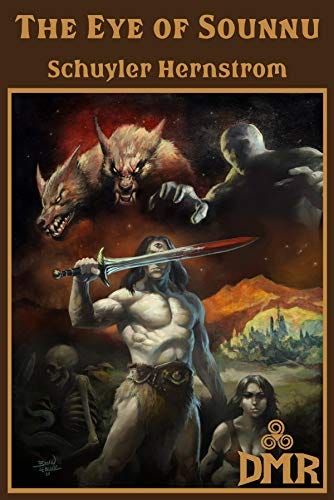Mortu and Kyrus in the White City
"You may talk of cities and justice all you wish. Tonight, the pagan wins."
In the far future, centuries after aliens enslaved mankind only to be thrown down by the mutinous Men of the North, a pagan Northern axeman, Mortu, and a cursed Christian monkey monk, Kyrus, scream down the ruined roads on the back of a motorcycle. The pair seek a remedy to Kyrus’s curse in the wastes to the east of fair Zantyum. But a chance encounter with a nomad caravan—and a misunderstanding with a Christian crusader—send the duo to the White City, an ageless paradise that hides a terrible secret.
Thus starts “Mortu and Kyrus in the White City”, the introductory tale of Schuyler Hernstrom’s sword and sorcery duo. Hernstrom writes Norse-influenced fantasy spanning a range from dark fairy tales to Norse myth and brooding sword and sorcery. He sketches the rise and fall of entire civilizations with a passing sentence, and blends adventure, tragedy, and philosophy into a heady blend that pays homage to Conan, Krull, and even Zothique. Here, Hernstrom tackles the sword and sorcery duo codified by Fafhrd and the Gray Mouser, and brings it back to its Weird Tales roots.
And Herstrom hunts high literature prey.
Much has been said in earlier reviews about the connection to Ursula Le Guin’s “The Ones Who Walk Away from Omelas”. This is a infamous thought experiment in print that forces people to consider upending a hedonistic paradise that is based on the suffering and neglect of a small child. Some have even pointed out the parallels to the various controversies and crimes present in SFF conventions at the time of writing. Rather than rehash these, let us instead notice Mortu’s method of cutting the apparent Gordian Knot created by Le Guin:
“Where are you going?
“I am going to kill everyone.”
A far more satisfying method of simplifying moral conundrums that merely walking away, especially when the White City’s paradise is supported by the repeated murder of children.
It is high and noble to take a place in the Great Conversation, and far more noble to rebuke a story that has been in the service of those who ever counsel avoiding confrontation at all cost. Let us not forget that this is sword and sorcery, and while Mortu’s heroic intent may be a beacon to a rough a ready justice forgotten by the civilized, do his actions match the intent?
After all, brooding among beautiful ruins do not a proper adventure make.
A dark secret has powerful enemies, and even more powerful protectors. Mortu navigates these conflicts with an air of mercy to one, and finality to the other. When decisive action and feats of strength are required, Mortu rises to the occasion. And his wroth is terrible, even to those he might otherwise call friends. Especially in the service of righting wrong. A skirmish with a knight and a duel with a White City swordsman add to his accolades.
But while Mortu makes sure a matter comes to a decisive end, it is to the monkey monk Kyrus whose learned mind and penchant for spying to solve the mysteries. Kyrus acts as foil and comedic relief to the brooding Northman, but his curiosity proves to be a boon time and again.
At this time, I must confess that this is the third time I have reviewed “Mortu and Kyrus in the White City”, and I hold the story in high regard as a perfect storm of theme, plot, and prose. Of the last, allow me to repeat some thoughts from a previous review.
“You may talk of cities and justice all you wish. Tonight, the pagan wins. My anger will be sated and these wicked people brought to ruin.”
Alexandru Constantin has argued that much of today’s writing style is too thin to support the heft of many story’s themes, ideas, and action. Until recently, I had yet to see that. Until “The Battlefield of Kerres” by Jim Breyfogle. The earlier adventures of Mongoose and Meerkat are somewhat undermined by today’s contemporary classic style, although later stories are growing into something stylistic that matches the stories. Other authors have had the same problem, including a good many taught by the community around the Life, the Universe, and Everything writers’ convention. There are good lessons for craft from those circles, but the style taught there is plain, transparent, and so thin that the outline blocks and concepts can be seen like a skeleton beneath the prose.
Sky Hernstrom instead uses a deliberate style to give Mortu and Kyrus an otherworldly almost dreamlike tone that carries the moral dilemma and axe and sorcery forward to its conclusion. Mortu’s dialogue is quotable, not because it is clever or whimsical, as too many writers try for, because it is heroic, with care to the best phrasing possible. I will leave it to others more skilled in English to dissect the Hernstrom style, but read a long section of Mortu and Kyrus, “The Gift of the Ob-Men”, or “The Law of the Wolves” out loud. You will hear the difference and how a heroic style gives heroic deeds more impact.
“Come then, try my steel and I will send you to hell where you belong. The gods of my people look down upon those that prey on the weak. There is no honor in it. There is no honor in you. I will enjoy killing you.”
“Mortu and Kyrus in the White City” can be found in The Eye of Sounnu. The duo return in “The Judgement of Daganha”, found in The Penultimate Men, with a third story soon to be released in Pilum Press’s rerelease of Thune’s Vision. And it is my hope that there will be many more.




